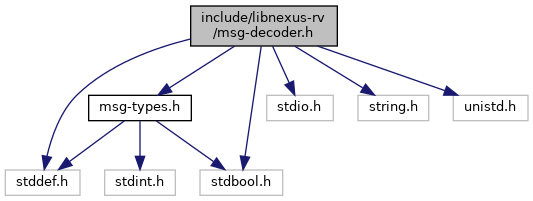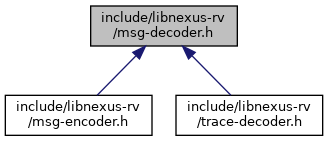#include "msg-types.h"#include <stddef.h>#include <stdio.h>#include <stdbool.h>#include <string.h>#include <unistd.h>

Go to the source code of this file.
Classes | |
| struct | nexusrv_hw_cfg |
| NexusRV Message decoder configuration. More... | |
| struct | nexusrv_msg_decoder |
| NexusRV Message decoder context. More... | |
Macros | |
| #define | NEXUS_RV_MSG_MAX_BYTES 38 |
Typedefs | |
| typedef struct nexusrv_hw_cfg | nexusrv_hw_cfg |
| NexusRV Message decoder configuration. More... | |
| typedef struct nexusrv_msg_decoder | nexusrv_msg_decoder |
| NexusRV Message decoder context. More... | |
Functions | |
| int | nexusrv_hwcfg_parse (nexusrv_hw_cfg *hwcfg, const char *str) |
| Parse the hwcfg string into hwcfg structure. More... | |
| ssize_t | nexusrv_sync_forward (const uint8_t *buffer, size_t limit) |
| Sync forward for the first full Message. More... | |
| ssize_t | nexusrv_sync_backward (const uint8_t *buffer, size_t pos) |
| Sync backward for the last full Message. More... | |
| ssize_t | nexusrv_msg_decode (const nexusrv_hw_cfg *hwcfg, const uint8_t *buffer, size_t limit, nexusrv_msg *msg) |
Decode the full NexusRV Message from buffer into msg. More... | |
| ssize_t | nexusrv_msg_decoder_next (nexusrv_msg_decoder *decoder, nexusrv_msg *msg) |
| Iteratively decode the next Nexus Message from trace file. More... | |
| uint8_t * | nexusrv_msg_decoder_lastmsg (nexusrv_msg_decoder *decoder) |
| Get the pointer to the last successfully decoded Message bytes. More... | |
| void | nexusrv_msg_decoder_rewind_last (nexusrv_msg_decoder *decoder) |
| Rewind the decoder to the beginning of last Message. More... | |
| int | nexusrv_print_msg (FILE *fp, const nexusrv_msg *msg) |
Print the msg in human readable form to fp. More... | |
Macro Definition Documentation
◆ NEXUS_RV_MSG_MAX_BYTES
| #define NEXUS_RV_MSG_MAX_BYTES 38 |
Maximum standard Message size in raw bytes
Typedef Documentation
◆ nexusrv_hw_cfg
| typedef struct nexusrv_hw_cfg nexusrv_hw_cfg |
NexusRV Message decoder configuration.
This should be set to match the HW implementation
◆ nexusrv_msg_decoder
| typedef struct nexusrv_msg_decoder nexusrv_msg_decoder |
NexusRV Message decoder context.
This should be initialized by nexusrv_msg_decoder_init before calling nexusrv_msg_next
Function Documentation
◆ nexusrv_hwcfg_parse()
| int nexusrv_hwcfg_parse | ( | nexusrv_hw_cfg * | hwcfg, |
| const char * | str | ||
| ) |
Parse the hwcfg string into hwcfg structure.
string is in the format of <option>,<option>=<value>,... Supported options:
- model= <string>: HW model. It predefines a set of option values
- model=generic32 implies: addr=32,stack=32
- model=generic64 implies: addr=64,stack=32
- model=p550x4 implies: src=2,ts=40,addr=48,stack=1023,ext-sifive
- model=p550x8 implies: src=3,ts=40,addr=48,stack=1023,ext-sifive
- ts= <integer>: Number of Timestamp bits
- src= <integer>: Number of SRC bits
- addr= <integer>: Width of ADDR reported
- maxstack= <integer>: Upper-bound of return stack depth
- timerfreq= <integer Hz/KHz/MHz/GHz>: Timer frequency
- quirk-sifive: Use Sifive Trace quirks
- no-quirk-sifive: Disable Sifive Trace quirks (if enabled previously)
- Parameters
-
[out] hwcfg parsed hwcfg [in] str hwcfg string
- Return values
-
==0 Parse successful -nexus_hwcfg_invalid The hwcfg string is invalid
◆ nexusrv_msg_decode()
| ssize_t nexusrv_msg_decode | ( | const nexusrv_hw_cfg * | hwcfg, |
| const uint8_t * | buffer, | ||
| size_t | limit, | ||
| nexusrv_msg * | msg | ||
| ) |
Decode the full NexusRV Message from buffer into msg.
- Parameters
-
[in] hwcfg Must match the HW implementation that produced the trace buffer The buffer that holds the Message limit Should be set to the number of bytes in buffer[out] msg Decoded Message
- Return values
-
>0 the number of bytes consumed (a positive integer) on a success decoding of msg-nexus_stream_truncate if more bytes are expected from buffer-nexus_msg_invalid if decoded msgis invalid-nexus_msg_missing_field if decoded msghas missing fields
◆ nexusrv_msg_decoder_lastmsg()
| uint8_t* nexusrv_msg_decoder_lastmsg | ( | nexusrv_msg_decoder * | decoder | ) |
Get the pointer to the last successfully decoded Message bytes.
Returns the pointer to bytes of last Message. It must be called after a successful return of nexusrv_msg_decoder_next, otherwise it returns NULL
- Parameters
-
[in] decoder The same decoder used by nexusrv_msg_decoder_next
- Returns
- The pointer to the raw Message bytes
◆ nexusrv_msg_decoder_next()
| ssize_t nexusrv_msg_decoder_next | ( | nexusrv_msg_decoder * | decoder, |
| nexusrv_msg * | msg | ||
| ) |
Iteratively decode the next Nexus Message from trace file.
It handles buffer fill and refill transparently, and caller is hence freed from dealing with -nexus_stream_truncate.
- Parameters
-
[in] decoder Should be initialized by nexusrv_msg_decoder_init [out] msg Decoded Message
- Return values
-
==0 if no more Message to decode (EOF) >0 the number of bytes consumed (a positive integer) on a success decoding of msg(same as nexusrv_msg_decode)-nexus_stream_truncate if EOF is already reached, and there's a partial Message at the end. -nexus_stream_read_failed if read decoder.fdhas failed, error can be retrieved from errno-nexus_buffer_too_small if the size of decoder.bufferis too small to fit a single Message-nexus_msg_invalid if decoded msgis invalid-nexus_msg_missing_field if decoded msghas missing fields
◆ nexusrv_msg_decoder_rewind_last()
| void nexusrv_msg_decoder_rewind_last | ( | nexusrv_msg_decoder * | decoder | ) |
Rewind the decoder to the beginning of last Message.
Rewind the decoder to point to the beginning of last Message, so it can be decoded again. This effectively "returns" the Message to the decoder. It does nothing if there's no previous invocation of nexusrv_msg_decoder_next, or it has already been called for the previous nexusrv_msg_decoder_next.
- Parameters
-
[in] decoder The same decoder used by nexusrv_msg_decoder_next
◆ nexusrv_print_msg()
| int nexusrv_print_msg | ( | FILE * | fp, |
| const nexusrv_msg * | msg | ||
| ) |
Print the msg in human readable form to fp.
Returns the total number of bytes written on success (as printf does), Or, on failure, the same return code of the first failed fprintf.
◆ nexusrv_sync_backward()
| ssize_t nexusrv_sync_backward | ( | const uint8_t * | buffer, |
| size_t | pos | ||
| ) |
Sync backward for the last full Message.
It stops at the byte where the preceding byte has MSEO==3
- Parameters
-
buffer The buffer that holds Messages pos Should be set to the current position in buffer
- Return values
-
>0 The position of the first full Message on success. The returned position can be equal to pos, which means thebuffercontains a single Message, and we have just passed it.-nexus_stream_truncate If cannot find the beginning of the full Message in buffer
◆ nexusrv_sync_forward()
| ssize_t nexusrv_sync_forward | ( | const uint8_t * | buffer, |
| size_t | limit | ||
| ) |
Sync forward for the first full Message.
It stops at the byte where the preceding byte has MSEO==3
- Parameters
-
buffer The buffer that holds Messages limit Should be set to the number of bytes in buffer
- Return values
-
>0 The offset to the first full Message on success. The returned offset can be equal to limit, which means thebuffercontains a single Message, and we have just passed it.-nexus_stream_truncate If cannot find the beginning of the full Message in buffer